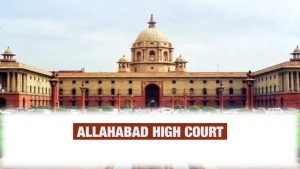 The Hon’ble High Court of Allahabad vide its order dated 20th October 2022 in the matter of State of U.P. Thru. Secy. Institutional Finance UP LKO and Ors. Vs. Maa Vindhyavasini Tobacco Pvt. Ltd. in Writ – C No. – 20203 of 2019, finding that the assessee has not approached the revenue authorities for availing the benefit which flow from section 129, coupled with the fact that the appellate authority found that the basis for initiating proceedings were non-existent, dismissed the Writ petition filed by the revenue.
The Hon’ble High Court of Allahabad vide its order dated 20th October 2022 in the matter of State of U.P. Thru. Secy. Institutional Finance UP LKO and Ors. Vs. Maa Vindhyavasini Tobacco Pvt. Ltd. in Writ – C No. – 20203 of 2019, finding that the assessee has not approached the revenue authorities for availing the benefit which flow from section 129, coupled with the fact that the appellate authority found that the basis for initiating proceedings were non-existent, dismissed the Writ petition filed by the revenue.
The writ petition was filed by the revenue challenging the order dated 22.06.2019 passed by the appellate authority in Appeal No.19 of 2019 whereby the demand of tax and penalty imposed vide order dated 17.05.2019 under Section 129(3) of the CGST Act was set aside.
Facts of the Case: –
- That the goods transported by the respondent were intercepted on 28.04.2019 on the intelligence received by the petitioners that the goods were being transported on the basis of tax invoices which were pre used.
- Thereafter, the statement of the truck driver was recorded and on the basis of the statement, the authorities proceeded to pass an order under Section 129(3) of the CGST Act after serving the copy of the notice to the respondent.
- That through the aforesaid order, the respondent was directed to pay the tax on the goods being transported amounting to Rs.7,23,700/- and further cess of Rs.19,05,024/-
- The respondent against the said order preferred an appeal against the appellate authority, which by the impugned order held that there was no material available with the authorities concerned for detention and seizure of the goods, for passing the orders under Section 129 (3) of the CGST Act. Further it is a well settled law that levy of tax and penalty cannot be based upon the presumption.
Petitioner’s Submissions: –
- It was submitted on the behalf of the petitioners that an intelligence was received that the goods are being transported twice over on the same set of invoices.
Held: –
- The Hon’ble Court after considering the submissions made and the facts of the found that the said argument of the petitioners cannot be accepted as the goods to be transported have to be accompanied by E-way bills as provided under Section 138 of the Rules framed under CGST Act, and this fact that the said set of E- way bills would use neither emerged in the assessment order nor is there any basis to arrive at the conclusion that the appellate authority rightly allowed the appeal preferred by the respondent and directed for release of goods and the transport vehicle.
- Further the plain reading of provisions of Section 129 makes it clear that for release of goods intercepted during transportation on the ground as prescribed therein and provides an opportunity to the assessee to take the benefit and to come forward for release of the goods on payment of the amounts as indicated in Section 129 (1)(a)(b) & (c) and the penalty payable to be determined under Section 129(3). However, the said power is purely an alternate mode given to the assessees to come forward and to avoid any future litigation and to offer and pay the amount.
- It was found that if the assessee does not avail the benefit under Section 129, the department is clearly free to take recourse under Chapter 15 read with Section 122 of the CGST Act to take steps for determining the tax due liability and the penalty.
- Lastly, it was found by the Hon’ble Court that in the instant matter the respondent has not approached for availing the benefit that flow from Section 129, coupled with the fact that the appellate authority found that the basis for initiating proceedings were non-existent. Therefore, there seems to be no reason to interfere with the order passed by the appellate authority, in exercise of powers under Section 226 of the Constitution of India.
The Hon’ble Court with the above findings dismissed the Writ petition filed by Revenue.



